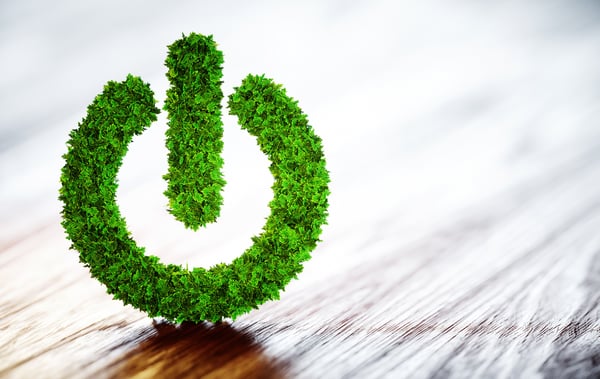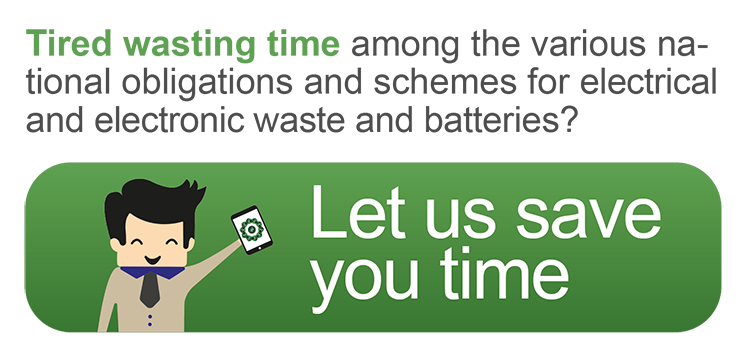“Would you allow your child to drive a car before they held an official driver’s license?”
Selling electrical and electronic equipment is an elaborate business. Designing, sourcing, manufacturing, logistics and fulfillment, shipping, importing, distributing… Some or all of these steps may be necessary to make a new product available on the market.
Nowadays, producers are not only liable for the design, manufacture and distribution of their products, they are also liable for establishing compliance, take-back and recycling solutions, either individually or collectively with other producers. In other words, it is part of producer responsibility to manage the collection and recycling of own or equivalent products.
This is one of the stated objectives of the WEEE directive (directive 2012/19/EU and its precursor directive 2002/96/EC). Although it is often perceived as a legal constraint for businesses, more and more companies do understand the purpose of compliance and recycling. So what are then the benefits of establishing processes for WEEE compliance and recycling?
The WEEE directive first of all sets strict requirements for EEE producers. In a typical country (assuming such a thing exists), producers, i.e. businesses, are:
- obliged to be registered at the country’s company registry
- obliged to declare quantities of product placed on market in a calendar year
- invited where possible to arrange a contract with a take-back and recycling or producer compliance scheme
- obliged to finance a waste collection and recycling service, available for equivalent products
- obliged to display information (e.g. labelling with crossed-out wheeled bin symbol) regarding compliance and end-of-life management so that end-users know what they need to do when disposing of equipment
- obliged to report on the amounts of material they were responsible for in terms of take-back and recycling, e.g. with the support of their producer compliance scheme
What are the benefits of WEEE compliance and recycling?
1: Market access and product compliance
2: Facilitating deals with partners
3: Securing trademark and brand image
4: Market differentiation
5: Availability of take-back and recycling services (for clients, business partners and warehouses)
6: Contributing to a company’s corporate social responsibility and ethical code of conduct
7: Cost optimization with the support of a compliance and recycling hub
WEEE compliance usually requires 2 steps: -
A: registration and establishment of compliance paperwork
B: reporting and financing of take-back scheme/recycling
A: Registration and establishment of compliance paperwork
This step can be explained as market access approval for products: WEEE compliance is mandatory for each national market that equipment is placed one.
Benefit 1: Market access and product compliance
WEEE compliance has become a mandatory step taken prior to the first instance of placing a new device or item of equipment on the market.
Every day across the globe, millions of items of Electrical and Electronic Equipment (EEE) are placed on the market and purchased. In many countries, businesses placing electronic equipment on the market also manage order fulfilment and customs proceedings as well as administrative procedures and product compliance certifications.
A government body, such as an environment agency, not only requires businesses to take care of product certifications and compliance obligations, it also requires businesses to comply with WEEE obligations as well as battery and packaging waste regulations in order to provide for the recycling of WEEE.
Benefit 2: Facilitating deals with partners
Secure your WEEE registration number
The process of registering generates a registration number from the authorities. This registration number is sometimes required by business partners like re-sellers, distributors and retailers.
![]() In Germany, producers are obliged to display the WEEE registration number obtained from ‘Stiftung ear’ (the German clearing house for WEEE producers) on all invoices.
In Germany, producers are obliged to display the WEEE registration number obtained from ‘Stiftung ear’ (the German clearing house for WEEE producers) on all invoices.
Benefit 3: Securing trademark and brand image
Some national authorities have made the national registry available on-line so that anyone can check if a company is registered in the country in question. For example, Syderep is the national registry managed by the Environment Agency (ADEME) on behalf of the French authorities.
Registration must be carefully managed to take into account new products or entities.
Producers maintain and renew their registration with the support of a compliance and recycling hub, and/or via a local compliance scheme.
Benefit 4: Market differentiation
Public and private tenderers rely on WEEE compliance criteria when selecting their contract partners. Stewardship organizations have now incorporated these criteria in their selection catalogue.
B: Reporting and financing of take-back scheme/recycling
Once a company has been allocated a registration number, the second phase of compliance can begin.
At least once a year, producers must report on the quantities and weights of the products they have made available on the local market. N.B. Only quantities of goods in transit (going to another country) are excluded from reporting requirements.
Reporting is mainly managed via compliance and take-back schemes, although some countries require a direct declaration to be made to the responsible authorities.
Reporting frequencies vary from one country to another. Reporting can be required on a monthly, quarterly, half-yearly or annual basis.
The reporting of quantities and weights of material provides the basis for fee calculations.

Producers need to organize their databases so that the correct data is available for reporting purposes. The financing of take-back activities looks rather like a pension system: new products sold in a given year finance the take-back and recycling of equivalent waste product arising in the same year.
Benefit 5: Availability of take-back and recycling services (for clients, business partners and warehouses)
Producers are obliged to finance the take-back and recycling of equivalent waste products as a means of contributing to a country’s waste collection targets.
Information on take-back and recycling services must be provided to clients, business partners, re-sellers, end users, etc. on request. Fulfillment of compliance can harmonize services across Europe for clients
Equivalent waste streams will be collected and recycled accordingly. Hazardous substances will be captured for safe and careful disposal. Valuable materials will be extracted and sorted for recycling or recovery.
Prior to dismantling, certain items of equipment can be sorted in order to facilitate re-use, in accordance with the principles of the circular economy.
Benefit 6: Contributing to a company’s corporate social responsibility and ethical code of conduct
What are the risks associated with a failure to manage WEEE compliance?
Risks are analyzed in each individual country. The appropriate authorities can delegate checks and controls to external parties such as private audit companies or compliance schemes.
Controls can be imposed by environmental agencies as well as by fiscal or financial controllers.
There are multiple risks for non-compliance:
- market access prohibition whereby products and brands can no longer be marketed and sold in a given country until compliance is established
- refusal of tenders
- distributor refusal to sell products from a non-compliant provider
- penalty fees per products undeclared
- penalty fees for missing information, e.g. absence of crossed-out wheeled bin symbol, no information available on the web etc.
- penalties for not applying the Visible Fee where this is mandatory (notably in France)
- penalties for not implementing the eco-modulation of fees (again, particularly in France) and eco-design criteria
- issues with corporate image such as a threat to trademark or brand name
Benefit 7: Cost optimization with the support of a compliance and recycling hub
WEEE compliance is required in each country where a legal framework for WEEE regulation exists.
The establishment and ongoing management of compliance can be organized with the support of external organizations whose aim it is to facilitate registration and compliance, sign-up with compliance schemes, reporting and operations management.
Finally, a compliance and recycling hub can provide appropriate solutions to other producer needs, e.g. considering specific logistic or recycling needs, market entry, modifications to organizational structure and so on.
Romain Letenneur



